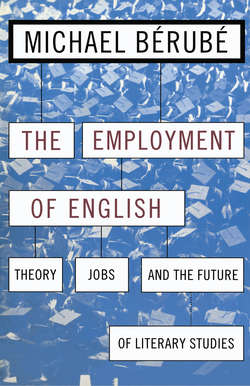Читать книгу Employment of English - Michael Berube - Страница 10
На сайте Литреса книга снята с продажи.
NOTES
Оглавление1. As Peter Brooks has said in his important essay, “Aesthetics and Ideology—What Happened to Poetics?”
Students are only too willing to short-circuit the aesthetic, and to perform any kind of reading, including the ideological, that you indicate to them. What is more difficult for them—and hence more necessary—is to slow up the work of interpretation, the attempt to turn the text into some other discourse or system, and to consider it as a manifestation of the conventions, constraints and possibilities of literature. . . . Students need in the work on literature to encounter a moment of poetics—a moment in which they are forced to ask not only what the text means, but as well how it means, what its grounds as a meaning-making sign system are, and how we as readers, through the competence we have gained by reading other texts, activate and deploy systems that allow us to detect or create meaning. (In Levine 160–61)
2. One of the reasons it is useful to contest the narrative of decline is that the Right has jerry-rigged and publicized that narrative for its own purposes, and in so doing has distorted or suppressed everything that doesn’t fit the narrative. For instance, the well-publicized National Association of Scholars’ study of “core courses,” released in 1996, claimed that American universities had precipitously “declined” since 1964 in that fewer colleges required Western Civilization courses of their undergraduates. What the NAS study deliberately hides, however, is that although the number of universities offering core courses has declined since 1964, that number has increased in the past decade and a half; the reason the NAS chose 1964 as the basis of comparison, of course, is that it allows the NAS to blame the “decline” of higher education on their all-purpose scapegoat, the sixties. Pat Robertson and the Christian Coalition, in weaving their narrative of decline about primary public schools, like to focus on 1962, the year the Supreme Court banned prayer from the classroom; the NAS chooses 1964 presumably because once the Free Speech Movement had taken hold at Berkeley, the chant of “hey hey, ho ho, Western culture’s got to go” was merely inevitable.
3. For discussion of the rise in graduate enrollments, by contrast, see Bérubé and Nelson 18–20.
4. For a more detailed version of my analysis of Readings, Guillory, and cultural capital, see my review essay, “The Abuses of the University,” forthcoming in American Literary History.
5. For a discussion of “critical cosmopolitanism,” see Robbins, Secular Vocations; for the relation between nationalism and canons, see Connor, Postmodernist Culture; Eagleton, Literary Theory; Graff, Professing Literature; and Shumway, Creating American Civilization; for “nationalist” literatures and their relation to postcolonialism, see Ahmad, In Theory.
